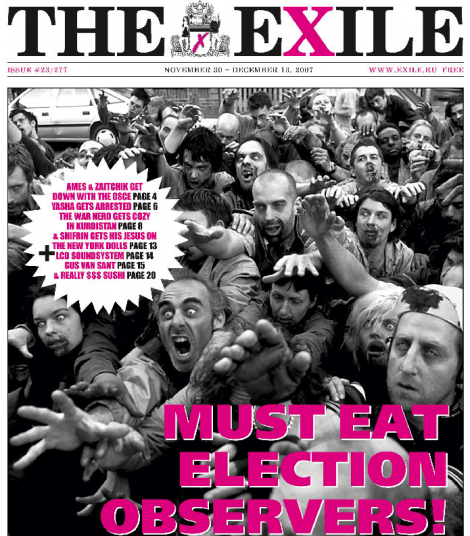
With Russians on the streets protesting yet another fraud-riddled election, and Hillary Clinton lecturing the Kremlin on the evils of election fraud, we are reposting this important background story on Russian election fraud, and how the West, led by Hillary’s husband Bill, enabled and whitewashed Russia’s 1996 fraud-riddled, stolen elections, which assured that the hugely unpopular Boris Yeltsin, “the butcher of Chechnya” and the creator of Russia’s oligarchy, would remain in power for another term–thanks to the Chechens overwhelmingly “voting” “for” Yeltsin by an overwhelming 73% vote (of 1 million votes even though there were only an estimated 500,000 voting-aged people living in Chechnya at the time of the 1996 presidential elections). Yeltsin’s Western-backed victory allowed him to pick his own successor, Vladimir Putin, in 2000–and here we are today. Among the top whitewashers of 1996’s stolen elections was none other than Michael McFaul, President Obama’s nominee to become the new US Ambassador to Russia.
This article by Alexander Zaitchik and Mark Ames, about the West’s active complicity in Russian election fraud, in creating the template still used today by Putin, was first published in The eXile on November 30, 2007, on the eve of Russia’s 2007 Duma elections, the last time Russians voted in parliamentary elections until this past Sunday.
Who Killed The OSCE?
Ex-OSCE Mission Chief Reveals “Pressure” To Whitewash ’96 Election
“A Victory for Russian Democracy”
—Title of a New York Times editorial, days after the ODIHR-approved 1996 presidential election
“Exit, Russian Democracy”
—Title of a New York Times editorial, days before the ODIHR-boycotted 2007 Duma elections
MOSCOW–When Russia told the OSCE that their election monitoring mission would be severely limited last month, it seemed as though Putin had fired an authoritarian shot out of the blue, baring his inner Stalinist once and for all. The West reacted as if the OSCE was the crucifix of democracy, and Putin’s rejection of that crucifix was evil rejecting good.
Well, that’s one way of looking at it. Another way is that the recent Russia-OSCE door-slamming episode is the inevitable outcome of years of cynical Western manipulation of an organization that once held enormous promise and impeccable credentials, but is now with good reason considered a propaganda tool for the West.
If that last sentence sounds like the paranoid rant of a Putin-era silovik revanchist, then think again. It’s the view held by none other than the man who headed the OSCE’s 1996 election mission in Russia, Michael Meadowcroft.
“The West let Russia down, and it’s a shame,” said Meadowcroft, a former British MP and veteran of 48 election-monitoring missions to 35 countries.
In a recent telephone interview with The eXile, Meadowcroft explained how he was pressured by OSCE and EU authorities to ignore serious irregularities in Boris Yeltsin’s heavily manipulated 1996 election victory, and how EU officials suppressed a report about the Russian media’s near-total subservience to pro-Yeltsin forces.
“Up to the last minute I was being pressured by [the OSCE higher-ups in] Warsaw to change what I wanted to say,” said Meadowcroft. “In terms of what the OSCE was prepared to say publicly about the election, they were very opposed to any suggestion that the election had been manipulated.”
In fact, he says, the OSCE and the West had made its mind up about how wonderfully free and fair Boris Yeltsin’s election was before voting even started.
“The OSCE parliamentary assembly had a separate mission who were passionately pro-Yeltsin,” he said. “So you had two OSCE missions for the election, one of which arrived predisposed to say things were good.” The other was pressured to agree.
Evidence of fraud, such as entire towns in Chechnya voting overwhelmingly for Yeltsin, caused Meadowcroft to liken the 1996 election to those held in African dictatorships. “In Chechnya they’d been bombed out of existence, and there they were all supposedly voting for Yeltsin. It’s like what happens in Cameroon,” he said.
While the Western media portrays the Russia-OSCE spat as a simple battle between bright democracy and dark autocracy, the Russian elite has a deeply cynical view of the OSCE based on personal experience. As Meadowcroft was not allowed to say at the time, Yeltsin’s victory in 1996 was rife with fraud. Most important to the outcome was the months-long blanket television support Yeltsin received and a “black PR” campaign against his Communist foe, Gennady Zyuganov; Russia’s print media was almost as bad. The election was not a “victory for optimists,” as the Hoover Institute’s notorious Yeltsin-cheerleader Michael McFaul wrote at the time. Rather, the technology of the fraudulent election, blessed by the West, served as the template for future Russian elections. But if few in the West know about this, it’s because the OSCE and the Western media only began to emphasize Russia’s systemic electoral fraud and media manipulation in 2003.
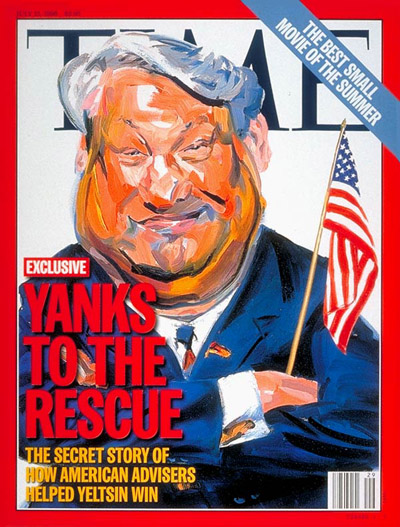
Something to be proud of: “Yanks To The Rescue: The Secret Story of How American Advisers Helped Yeltsin Win”
“[The West] didn’t want [pre-election] criticism that the election had been manipulated, lest the Communists get public mileage out of it,” said Meadowcroft. “And the Communists regarded it as par for the course that they wouldn’t get a fair deal. I went to see the Zyuganov team and they said, ‘Oh it’s a waste of time to give you the dossier [on election fraud], you’re not going to do anything about it anyway.'”
He added that the EU tried to suppress a report about media manipulation submitted by a Belgian colleague working for an EU institution. When he was barred from releasing the report, he handed it over to Meadowcroft, who released it to the media as a private citizen. Few noticed or cared at the time.
Instead, here’s the kind of spin Western publics heard after the 1996 election:
“The preliminary conclusion of the IRI delegation is that this election was Russia’s best ever and reflected the great strides made by the Russian people in institutionalizing their democracy.”
–American observer William Ball III, of the US-funded International Republican Institute NGO, July 1996
“Voting was held… in a democratic, impartial and fair manner.”
–Ernst Meulemann, an observer from the Council of Europe, July 1996
“Now it’s true that President Yeltsin used his incumbency to his own advantage. It’s also true that the Communist candidate, Mr. Zyuganov, used the fact that the Communist Party, the Russian Federation, has a huge grassroots organization, by far the best, the biggest, and most complex organization in Russia, to its advantage. But a number of international observers have judged this to be a free and fair election.”
–Deputy Secretary of State Strobe Talbott, July 1996
“For all the mutual distrust and suspicion that preceded the election, there was consensus on the part of the Government, the Communist opposition and international observers that Sunday’s election had been for the most part free and fair.”
—New York Times, June 18, 1996
“OSCE: ELECTION GENERALLY FREE AND FAIR:
Even before the final results had been tabulated, a delegation of 500 election monitors from the OSCE issued a preliminary statement on 17 June declaring the first round of the Russian presidential election “generally free and fair.”
Radio Free Europe/Radio Liberty Europe, June 1996.
Meadowcroft is still shocked by the manipulation of his assessment of the election. “I never said ‘free and fair.’ The weasel words I used were something like ‘a step forward for democracy,’ but I certainly wouldn’t say ‘free and fair’ as far as I was recording it,” he said.
The OSCE continued pumping out glass-half-full reports into the Putin era. In 2000, it was quick to sign off on Putin’s first-round victory, despite widespread evidence of fraud, some of it uncovered by the Moscow Times. “The OSCE should not have approved [the 2000 elections],” the Yabloko party spokesman, Sergei Loktyonov, told the eXile after Putin’s 2003 reelection. “It’s hard to say why they did that.”
But is it? In 2000, Putin was still seen as a “reformer”, as the West’s guy. He had not yet begun to cross Western oil interests or to reassert an independent and muscular foreign policy. Fast forward to 2003 and the OSCE was singing a different tune.
The OSCE hasn’t just destroyed its credibility with its strange criteria for judging some Russian elections fair and others not. As the world considers Moscow’s charge of undue American influence on the organization, it’s worth pulling an OSCE “greatest hit” out of the memory hole. In the run up to the Kosovo war, the organization was used a front for the CIA to deliver communications equipment to the Kosovo Liberation Army, and to gather targeting information for an expected upcoming NATO bombing campaign. As reported by the New York Times in March of 2000:
“When the Organisation for Security and Co-operation in Europe (OSCE), which co-ordinated the [human rights] monitoring, left Kosovo a week before airstrikes began a year ago, many of its satellite telephones and global positioning systems were secretly handed to the KLA, ensuring that guerrilla commanders could stay in touch with NATO and Washington. Several KLA leaders had the mobile phone number of General Wesley Clark, the NATO commander. European diplomats then working for the OSCE claim it was betrayed by an American policy that made airstrikes inevitable. Some have questioned the motives and loyalties of William Walker, the American OSCE head of mission. ‘The American agenda consisted of their diplomatic observers, aka the CIA, operating on completely different terms to the rest of Europe and the OSCE,’ said a European envoy.”
To longtime democracy professionals and election monitors like Meadowcroft, this cynical exploitation of the organization’s good name set the stage for the OSCE’s downfall–a downfall now being blamed on “little brother” non-NATO member countries on the OSCE’s eastern flank.
“The sad thing is that because the OSCE has not been as forthright as it should have been, the people who regard monitoring as a waste of time use this as an argument against it,” said Meadowcroft, reflecting on current Kremlin-OSCE row. “That’s the distressing thing. I feel like even I was compromised by not being tougher. But it’s hard when you’ve got five minutes to go before the press conference and this guy from Warsaw is on the phone saying ‘You can’t say that!’ I said, ‘Look I’m going to speak to the press.’ The response was, ‘No, you can’t say that.’ It was very difficult for me.”
* * *
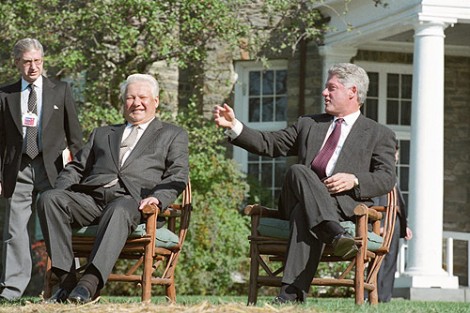
Meadowcroft’s revelations are significant for a lot of reasons. In the first place, we at The eXile are left once again scratching our heads, wondering why no one from the mainstream media bothered contacting the man who headed the observer mission during the most “free and fair” election in post-communist Russian history.
His revelations also help put into perspective what is really going on with Russia’s near-death experiment with democracy. The new low that we’ve reached in late 2007 is not some out-of-the-blue invention of Putin and his siloviki cronies, but rather the result of a joint effort which saw the worst of both sides. Democracy as birthed and fed under Boris Yeltsin was always something like the semi-stillborn fetal-freak in Eraserhead. Most of the Yeltsin-era elite saw formal democracy as a pain in the ass that had to be kept alive to for visiting Western delegations, who looked at the croaking, spitting fetus, covered in rot and slime, and declared, “It looks just like Lady Liberty!”
Meadowcroft relayed some of his own experiences with Yeltsin’s elite “young reformers” and their western enablers—what he called the”economic mafia”:
“What I was being told [by them] in 1996… ‘Why are you bothering us about elections? We’re not going to let this place fall. We’re making too much money. Why bother with elections?”
This paints a familiar if often ignored picture, one that implicates the West in the collapse of OSCE credibility in particular, and the near-comatose state of Russian democracy in general. It’s not fair to simply blame the West for Russia’s problems; but it’s equally disingenuous to deny the West’s role in screwing things up. The current narrative of a happy past and pure elections versus a dark present and lost democracy is easy to swallow but destructive insofar as it increases misunderstanding and paranoia on both sides. Needless to say, it also enables those in the west leading us into a new Cold War based partially on the fantasy of a glorious Russian democratic-past that never was, or at least not since Yeltsin’s shelling of his opposition parliament in 1993.
It’s not that the West won’t be right when it condemns this weekend’s vote. In OSCE jargon, the Duma elections will be “fundamentally flawed.” They will “fall far short” of western standards, if not expectations. It’s not a secret that the Russian state-run media are grotesquely pro-Putin. Or that the election laws have been changed to shut out opposition parties. Or that, as in previous elections, there will likely be some old-fashioned ballot stuffing in the provinces.
Not for the first time, the Moscow Times has helped fill in the blanks with regard to the electoral shenanigans taking place across the country. In a report published November 27, the paper details insider allegations of fraud and the pressure—including outright intimidation and threats—some Russians are experiencing from their employers to vote for United Russia, Putin’s Party, on December 2.
Whatever adjectives are thrown at the elections on December 3, everyone agrees that “Swedish” won’t be among them.
But of all the many statements being made about Putin’s “managed democracy,” the boycott by the OSCE’s Office for Democratic Institutions and Human Rights is considered the most profound. It is certainly the most influential. The ODIHR is still considered the gold standard in the democracy watch-dog game. When it says Boris Yeltsin was elected fair and square in 1996, the New York Times and the most of the rest of the western media were quick to declare a “Victory for Russian Democracy.” When the same body decided not to bless Russia with its presence this year, the country’s democracy was universally declared to have “Exited.”
The truth is it never entered. But that didn’t used to bother the democracy experts at the OSCE.
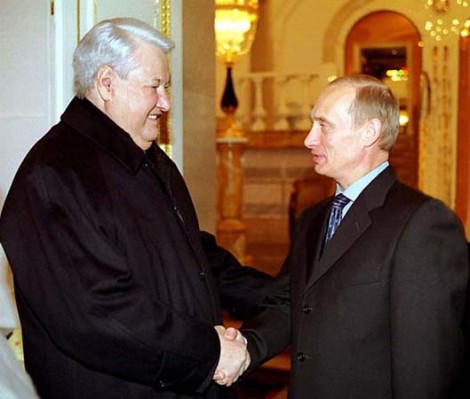
Meadowcroft has been involved in democracy-building and election-monitoring in Russia and the CIS countries since 1989. In the beginning, he said, international election monitors were seen as “the good guys.” That began to change when the OSCE wrested control of regional election-monitoring duties the United Nations. That, he says, is when the ideological rot set in.
“You could trace the subversion of the OSCE from the moment that the UN had to give way to the OSCE for election monitoring operations in its area,” says Meadowcroft. “There came a point where the UN’s electoral division was not strong enough to insist that it carry out missions in the OSCE region. It was forced to hand over its mission to the OSCE. The UN’s electoral affairs division was originally part of the political department of the UN, which was very strong. And it was shifted out. The UN was in effect politically forced to let the OSCE run stuff in its area. This was largely an American initiative.”
At the end of the Cold War, when the OSCE was still known as the Conference on Security and Cooperation in Europe, there were big hopes. The CSCE had been the forum for the major milestones that lessened superpower tensions and set the stage for the end of the Cold War, from the Helsinki Declaration on Human Rights to early negotiations on the Conventional Forces in Europe Treaty.
“There was this idea that the CSCE would be a ‘UN for Europe’. Havel would be its godfather, the Americans would endorse it, and it would take over the old Federal Parliament building in Prague when Czechoslovakia split,” said Christopher Lord, a former editor of Perspectives: A Central European Journal of Eastern European Affairs and a former consultant for the Czech Ministry of Foreign Affairs.
“What killed it was a proliferation of countries as the Eastern Bloc fragmented,” said Lord. “With the break-up of Yugoslavia the inherent weakness of the CSCE was revealed. Once it was exposed to the stresses of a hot war, the cold war dinosaur fell over sideways and died of shock. The urgency of the situation meant that attention in foreign ministries swung away from the CSCE and back to the UN, and especially NATO. The CSCE, along with the Western European Union, another structure which coulda been a contender, didn’t quite make it.”
The mid-90s brought an expansion of OSCE programs and saw the beginning of a steady shift in its focus. For most of its first 20 years, the CSCE was largely dedicated to hard security issues, with democracy and human rights playing a smaller role. After it was renamed the OSCE, the newly created Office for Democratic Institutions and Human Rights quickly began sucking up scarce resources and energy. Since then, eastern members have begun to tire of the “soft” half of the equation getting so much attention.
East-West tensions within the OSCE have been building for years. Now Russia and most other CIS countries have had enough of the democracy lecturing and want to shift the focus back to hard security matters. The OSCE is, after all, the one pan-European forum where they are, in theory, full and equal members.
Behind the headlines of the OSCE-Moscow spat, a larger showdown will take place at the end of the month in Madrid, at the OSCE’s annual end of the year meeting. There, a new group of OSCE nations, led by Russia, will try to redirect the future of the organization.
Writing in the Eurasia Daily Monitor, Vladimir Socor describes the goal of the new grouping:
“The Russia-led bloc calls for refocusing the OSCE on the military-political dimension… This move continues Moscow’s long-standing attempts to endow the OSCE with functions that could duplicate or interfere with those of NATO and maintain a Russian-influenced grey area in Europe’s East. The novel elements are the bloc basis and extended scope of the proposals. Russia hopes to build up the OSCE into an all-European security body and counterpose it to NATO, particularly in Europe’s East. This is why most Western countries have long resisted turning the OSCE into a full-fledged organization.”
The Russia-led group is also proposing new rules for the monitoring of elections. It wants to weaken what it sees as the western grip on ODIHR, slow the response time for issuing election reports, and spread monitoring missions more evenly across the OSCE’s turf—which famously spans “from Vancouver to Vladivostok.” By all accounts the Russia-led bloc means business and is willing to obstruct the organization’s work until a serious reform plan is on the table.
What all this means is that the OSCE’s judgment on this weekend’s elections is irrelevant. And so is the OSCE as we have come to know it.
Would you like to know more? Read Mark Ames’ “Over 10,000 in Moscow Protest Election Fraud” and “Doom-A: How To Watch Post-Soviet Politics.” Also read Edward Limonov’s “Kremlin Public Enemy No. 1”.
Buy The eXile: Sex, Drugs and Libel in the New Russia co-authored by Mark Ames and Matt Taibbi (Grove Press).
Click the cover & buy the book!
Read more: black pr, chechnya, clinton, election fraud, elections, gennady zyuganov, hacks, kosovo, michael mcfaul, michael meadowcroft, new york times, osce, putin, Russia, yeltsin, Alexander Zaitchik and Mark Ames, eXile Classic, Russia


Got something to say to us? Then send us a letter.
Want us to stick around? Donate to The eXiled.
Twitter twerps can follow us at twitter.com/exiledonline




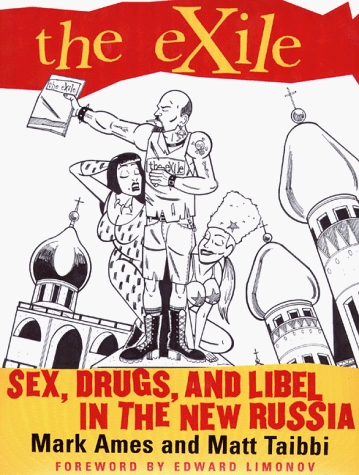











11 Comments
Add your own1. G.A. | December 9th, 2011 at 5:05 pm
Israelis even had the chutzpah to declare the Russian elections “fair and democratic” while everyone else is screaming bloody murder.
http://www.haaretz.com/news/diplomacy-defense/lieberman-russia-elections-were-fair-and-democratic-1.400189?localLinksEnabled=false
2. Erik | December 10th, 2011 at 4:02 am
This is why we read The Exiled.
3. wan | December 10th, 2011 at 11:20 am
Same fraud was used by Milosevic in Serbia. Kosovo Albanians boycotted elections, and SPS (his political party) supporters would steal this voices for their party…
4. Fischbyne | December 10th, 2011 at 12:30 pm
PRE-1989 DIPLOMACY: Those damned totalitarian Soviets. Their terrible system just can’t live up to American standards of democracy.
POST-1989: Those poor former Soviet states. They need all the help they can get in undermining democracy to get capitalism going.
5. internal exile | December 10th, 2011 at 1:10 pm
I wonder if there has ever been a fair election?
6. Sick Rat | December 10th, 2011 at 4:59 pm
How about an expose of Yeltsin’s 1993 ‘Constitution’? I guess regular Westerners have no idea the Constitutional referendum was a huge fraud, with the ballots incinerated soon after the vote to prevent a recount, as Yeltsin, his hands still dripping blood, growled ‘hands off the (draft) Constitution’ from TV screens to forcibly block any potential ‘No’ campaign.
7. Seth Burn | December 11th, 2011 at 11:28 pm
Lieberman is miserable. It is fairly well known he’s a worthless liar:
http://www.haaretz.com/news/diplomacy-defense/avigdor-lieberman-national-whitewasher-1.400589
And yes, the 1996 elections were also unclean, like those were earlier this year. It is good that the Russian people are speaking out.
8. MikeJake | December 12th, 2011 at 11:50 am
I didn’t realize Yeltsin was such a big dude.
9. johnUK | December 12th, 2011 at 6:05 pm
Where is the actually observers saying there was massive vote fraud?
Reports I have read is that there were some irregularities but overall well done.
The massive vote fraud scam seems to come from a NED, USAID funded NGO who the FSB where monitoring before the elections that were working with the US Sate Department and we know since Putin came to power the US and EU have been financing through front NGO’s all political and social opposition to Russia and ethnic Russian identity at one point as much as 600,000.
10. Bester | December 13th, 2011 at 12:34 am
http://apikabu.ru/img_n/2011-12_3/5fn.jpg
11. G.A. | December 14th, 2011 at 2:58 pm
@ 9. Hi John, I had no idea SVR took interest in ExileD website. Welcome!
Leave a Comment
(Open to all. Comments can and will be censored at whim and without warning.)
Subscribe to the comments via RSS Feed